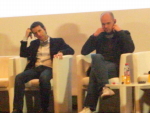ad:tech Paris: The Expanding, Contracting Media Ecosystem

No ad:tech's an ad:tech unless there's a session that speculates, however pointlessly, on the future of advertising. This particular variant featured New Media Director Robin Sloan of Current TV and General Director Travis Katz of MySpace. The moderator was Editor in Chief Nicolas Arpagian of Prospective Strategique.
Interesting sidenote about this panel: Arpegian posed all questions in French; Sloan and Katz wore magic insta-translating devices that enabled them to respond in English without missing a beat. It was so "Star Trek."
Sloan was up first, and he kicked off with something unexpected. Positioning his presentation as if we were already living in the year 2019, he walked us through the "past" 10 years.
Video snapshots below.
The birth of the "homo sapiens mediaphile" in 2010 ("the internet is actually changing our brains") -- and the grand failure that was Apple iGlasses, augmented reality devices that provide handy metadata on whatever you're looking at. Like that computer Sailor Mercury wears on her face.
In 2018, social networks "apply the logic of NASCAR" to their business model. Tastemakers connect with big brands, give birth to new buzzword (which, like every new buzzword, already feels like it's been tossed around the yard a few times): "social sponsorship."
The conclusion to the big 2019 presentation was that advertising, marketing and media are an interconnected ecosystem, much like all the elements that make up our natural one. The atmosphere's fragile, and we have to take care to strike as much of a healthy balance with our communications as with our carbon footprints.
Breaking away from the futurescape, Sloan demonstrates how on Current TV, users create the ads and decide which are worthy of dissemination.
"WOM is the great dark matter of advertising," Sloan said. "It's impossible to scale, hard to quantify, but we know it dwarfs everything else."
Here's a Current "Viewer Created Ad Message" for the Prius. It's called "Eugene and Jeannette."
And finally, in Q&A, Sloan's philosophy on producing ads that people want to see -- design-oriented material that respects the context, rather than fights with it:
Q&A was especially interesting, and I wish I'd gotten more footage. Sloan ruminated that people think the 'net's a unified, singular utopia, but it isn't; it's divided by region (France versus the US versus Russia, for example) and regulations (the Great Firewall of China, or licensing barriers: how Hulu doesn't work outside the States, or the BBC's iPlayer won't play outside the UK).
Apropos to net neutrality, certain media have always favored certain kinds of connections over others. Consider how the iPhone and Xbox are really good for really specific things, but not everything, that you want to do online.
All this left us with the sense that the internet -- which in a way serves as the framework for our media ecosystem -- is expanding, and we as people are carving dividing lines across it, marking territory and negotiating space. In contrast, Katz argued that "we are undoubtedly seeing that the world is becoming smaller through the internet. We see it on MySpace all the time."
Neither guy is wrong.
But for the purposes of this session, Katz in general was tough to nail down. Pretty much all he said was that MySpace absorbs about 50% of social networking ad spend, and gets buys from 90% of Fortune 500 advertisers.
The entire crux of his argument was that MySpace is robust enough that it can experiment with advertisers to build more relevant advertising. And in fact he seemed less interested in contemplating the industry's future than he was about reminding us of his brand's fading relevance. (Seriously. At some point he casually attributed the global success of Justice in great part to his company's grand scope. You could hear the entire French audience sucking its teeth in.)
Not to say the MySpace half was a complete bust. Katz did say one thing worth scribbling on the mirror: "There's no cost of ignoring an ad." It brought to mind something Paula Berg of Southwest said at Marketing 2.0: that where social media's concerned, you shouldn't think of what it'll cost you; you should consider the cost of not participating.
Nice juxtapo there: if you're having a one-sided conversation with users, it costs them nothing to ignore you. But if they've grown to hate you, and you fail to respond, that same ignorance could cost you plenty.
In the ongoing conversation between brands and people, the former has more to lose.
Topic: Events, Industry Events, Opinion, Trends and Culture

